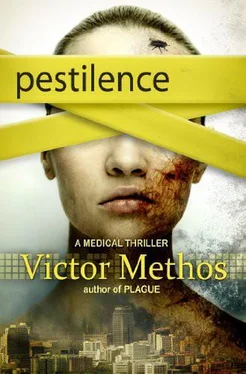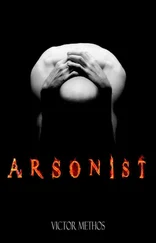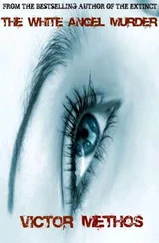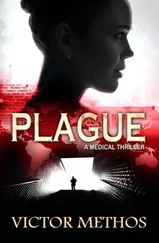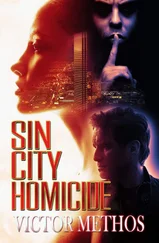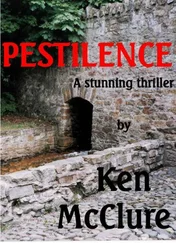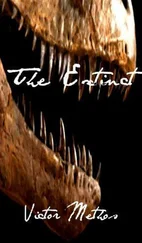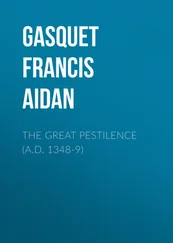Victor Methos - Pestilence
Здесь есть возможность читать онлайн «Victor Methos - Pestilence» весь текст электронной книги совершенно бесплатно (целиком полную версию без сокращений). В некоторых случаях можно слушать аудио, скачать через торрент в формате fb2 и присутствует краткое содержание. Жанр: Триллер, на английском языке. Описание произведения, (предисловие) а так же отзывы посетителей доступны на портале библиотеки ЛибКат.
- Название:Pestilence
- Автор:
- Жанр:
- Год:неизвестен
- ISBN:нет данных
- Рейтинг книги:5 / 5. Голосов: 1
-
Избранное:Добавить в избранное
- Отзывы:
-
Ваша оценка:
- 100
- 1
- 2
- 3
- 4
- 5
Pestilence: краткое содержание, описание и аннотация
Предлагаем к чтению аннотацию, описание, краткое содержание или предисловие (зависит от того, что написал сам автор книги «Pestilence»). Если вы не нашли необходимую информацию о книге — напишите в комментариях, мы постараемся отыскать её.
Pestilence — читать онлайн бесплатно полную книгу (весь текст) целиком
Ниже представлен текст книги, разбитый по страницам. Система сохранения места последней прочитанной страницы, позволяет с удобством читать онлайн бесплатно книгу «Pestilence», без необходимости каждый раз заново искать на чём Вы остановились. Поставьте закладку, и сможете в любой момент перейти на страницу, на которой закончили чтение.
Интервал:
Закладка:
“Dad, what’s going on?” his son asked.
He jumped into the driver’s seat. “We’re getting the hell out of California.”
63
Samantha rushed to CDC headquarters. She had asked her nurse to come in early and left her mother and Jessica in her care.
The city was buzzing with activity, and the freeways were packed. Many people had filled their cars to the brim with sleeping bags, clothing, water, and food. A handful of policemen were out, but nowhere near what would be required if all these people decided to start breaking into the closed stores.
Sam listened to NPR, and they were discussing the detonations. Contact had been cut off to Manhattan, Los Angeles, Nashville, and Washington, D.C. Rumors of multiple blasts in Pakistan, China, and all over Europe were circulating. But communications had been disrupted, and getting information was difficult. The internet, it seemed, was down worldwide.
She cut through a field and looped around a business park, avoiding the mess of traffic, and arrived at the CDC in about half an hour.
As she was stepping out of her car, she received the phone call she had been waiting for. “This is Samantha.”
“Clyde Olsen, Sam. It’s done. Your sister and her family are in Elko, Nevada.”
She sighed, all the tension and pain leaving her body. The only remnant was a soft emotional mess. “I don’t know how to thank you.”
“Figure out how to stop this thing. That’s how you can thank me.”
By the time she arrived at the CDC, the building was on lockdown, and she had to input a security code at the door. The door hissed and locked behind her. The building was nearly empty. She ran up to Freddy’s office but didn’t find anyone there. A conference room next door had four people in it; she stepped inside.
“There she is,” Freddy said. “Dr. Bower, we were just discussing the potential spread of the pathogen. Please have a seat.”
Samantha sat and waited for Freddy to begin speaking again. Up on the whiteboard was a rough drawing of the world. Small X’s were written on certain spots.
“Reports are few and far between,” Freddy said, taking off his glasses and mopping them with a small white cloth. “But it appears the pathogen can’t be contained. We’re getting reports from people leaving DC that entire city blocks are filled with the dead or dying. Apparently, it’s mutated, and its incubation period has dropped from several days to several hours.”
“I don’t think that’s it,” Samantha said.
“Why not?”
“That’s too quick a mutation. Although the pathogen mutates faster than anything I’ve ever seen, it couldn’t mutate that quickly. This is a different strand. Something we haven’t seen before.”
“How do you know?”
“Just a hunch.”
“Well, I guess, at this point, we’ll take anything.” Freddy pointed to two men sitting to Samantha’s right. “As far as I know, we don’t have any infected in Atlanta yet. See if you two can get some samples from any of the cities, and let’s test Sam’s theory.”
Freddy turned back to the whiteboard and discussed contingency plans, spread ratios, and infectious grid patterns. Sam was barely listening. She knew exactly what everyone in that room was already thinking: it was too late. Too many people in a grid that was too wide had been infected.
The virus would spread from city to city, slowly at first, perhaps over the course of a week. Then the speed of the infections would increase exponentially until it hit a tipping point. The tipping point in an infection pattern was that exact moment when we went from a society with infected to a society of infected, that point when the death of the species was certain. It takes approximately twelve to fifteen years for a human being to produce an offspring that can then breed-an enormous amount of time, biologically speaking. That was too slow to repopulate the species after the devastation of an extinction-level event.
Most of humanity would be infected within the first three months, and the only ones who wouldn’t be were the ones who could get out of the cities in time.
Samantha’s head hurt. She put her hand over her eyes and rubbed her temples. “This is pointless.”
Freddy stopped and turned to her. “Excuse me?”
“It’s out, Freddy. We can’t slow it. We can’t plan for it. The only thing we can do is hold on and wait until it runs its course.” She glanced around the room. “We’re not stopping it at this point. We’re trying to survive.”
64
The building was the tallest one in Miami: the Four Seasons Hotel. Hank Kraski had rented the top suite.
The palatial suite had a bed that appeared to have been made for ten people and a hot tub outside on the massive balcony. Chilled champagne and fresh lobster sat on the table. The suite was exactly the way he had asked.
He sat on the balcony, viewing the city below and the mass of ocean beyond it. He had loved Miami when he was a kid. He could go there and hock stolen baseball cards, packages of gum, or anything he and his friends could get their hands on. Such a shame that it had to be destroyed.
Though it wouldn’t be destroyed in the sense that it would be blown apart, but that the people were going to be eliminated. And without the people, there were no maintenance crews to keep the city running smoothly. Nature would need only a few weeks to reclaim what humans had taken.
Hank thought back to his childhood in Florida. He’d been happy with his Polish family that owned a restaurant in downtown Miami. The city had been different then, though, and a small-business owner could thrive without having to take massive loans from predatory banks just to stay afloat. Such a waste of talent, he thought. The little guys would get swallowed up or have to work for the big guys, and the consumers suffered. He didn’t blame the banks, though. He blamed the government dollars that kept them buoyant when they should have sunk.
But never, in a million years, could he have guessed that he would end up being one of the few people on earth who would survive to rebuild. The new society would be better. It would be more efficient, and the aristocracy would no longer rule the poor. That was why he had such great admiration for the virus. It saw no race, religion, economic status, or fame. The virus was lethal equally and had no regard for anything or anyone. It was… perfect.
His cell phone rang, and he answered. “This is Kraski.”
“It’s done. They’ll be arriving within a few hours.”
The line went dead. He placed the phone in his pocket and got the bottle of champagne before returning to the balcony. But, glancing over at the clear waters of the hot tub, he felt the urge to splash around. He stripped down and got in.
He decided that he would watch the end of the world from there.
65
Ngo Chon stood in the glass corridor at the CDC in Atlanta, observing the parking lot as he sipped tea out of a mug that had a saying on the side: Epidemiologists do it disease free.
The CDC. When he was younger, he had dreamed about working there. After medical school, he completed a doctorate and then realized he didn’t want to go into the world yet, so he completed another. By the time he got out of school at age thirty-nine, he thought he would be the most educated person at the CDC. He was shocked to find that at least half a dozen people had more degrees than he did, some of them from more prestigious schools.
But he’d outlasted them all. They transferred around, always vying for that position that would bolster their resumes. No matter how much they protested that they had purer motives, it was always about the resume with career academics and scientists. The CV determined the quality of the person.
Читать дальшеИнтервал:
Закладка:
Похожие книги на «Pestilence»
Представляем Вашему вниманию похожие книги на «Pestilence» списком для выбора. Мы отобрали схожую по названию и смыслу литературу в надежде предоставить читателям больше вариантов отыскать новые, интересные, ещё непрочитанные произведения.
Обсуждение, отзывы о книге «Pestilence» и просто собственные мнения читателей. Оставьте ваши комментарии, напишите, что Вы думаете о произведении, его смысле или главных героях. Укажите что конкретно понравилось, а что нет, и почему Вы так считаете.
